
The device(s) you use to access the eBook content must be authorized with an Adobe ID before you download the product otherwise it will fail to register correctly.
For further information see https://www.wildy.com/ebook-formats
Once the order is confirmed an automated e-mail will be sent to you to allow you to download the eBook.
All eBooks are supplied firm sale and cannot be returned. If you believe there is a fault with your eBook then contact us on ebooks@wildy.com and we will help in resolving the issue. This does not affect your statutory rights.
Economic sanctions are an instrument of foreign policy. They may, however, affect the legal – first of all contractual – relations between private parties. In such a case, the court or arbitration tribunal seized has to decide whether to give effect or not to the economic sanction. It is private international law that functions as a 'filter' and transmits economic sanctions having a public law origin to the realm of private law. The aim of this book is to examine how private international law rules can influence the enforcement of economic sanctions and the related foreign policy objectives. A coherent EU foreign policy position as well as legal certainty and predictability would suppose a uniform approach not only concerning the economic sanctions of the EU, but also with regard to the restrictive measures imposed by third countries. However, if we examine in detail the application of economic sanctions by the courts of the Member States and arbitral tribunals, we find a somewhat different picture. It will become obvious that one of the reasons for this is the divergence of the private international law approaches in the Member States.